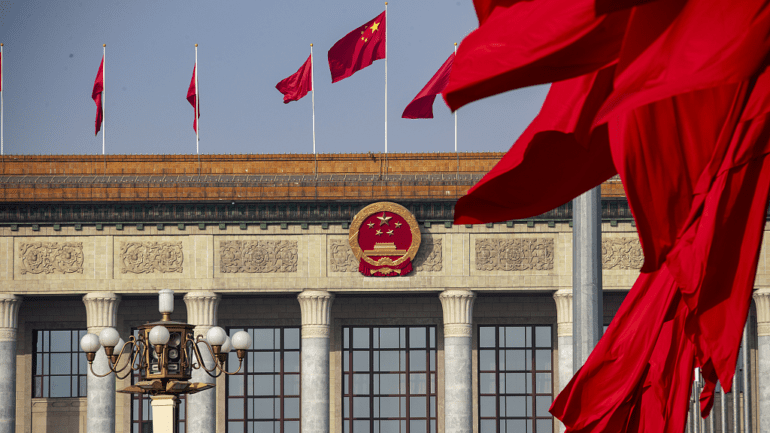TL;DR:
- Beijing government to limit generative AI in healthcare.
- New regulations prohibit AI-generated medical prescriptions.
- Regulations emphasize qualifications, experience for medical personnel.
- AI software is not allowed to replace doctors for diagnosis and treatment.
- National regulations on AI models focus on adherence to values.
- Beijing establishes a supervision platform for online healthcare.
- AI companies focus on industry-specific models, including healthcare.
- China’s online healthcare market is projected to reach $311.5 billion by 2026.
Main AI News:
In a strategic response to the surging interest in ChatGPT-like services and their potential impact on the healthcare sector, the municipal government of Beijing is orchestrating a bold move. The Chinese capital is poised to impose stringent limitations on the utilization of artificial intelligence (AI) in healthcare practices. This development comes as the authorities have drafted fresh regulations aimed at maintaining control over the proliferating AI technology.
A report published by the Beijing Daily, the official newspaper of the Chinese Communist Party’s municipal committee in the capital, reveals that the Beijing Municipal Health Commission is spearheading these regulations. The forthcoming rules will categorically prohibit the employment of AI for the automatic generation of medical prescriptions. This pioneering stance underscores Beijing’s commitment to striking a balance between technological advancement and the integrity of healthcare practices. Notably, public input is being actively sought regarding these proposed regulations, a process slated to continue until mid-September.
The comprehensive set of regulations, encompassing a total of 41 provisions, spans a spectrum of online healthcare activities. Among the stipulations, a pivotal requirement stands out: medical personnel within this sector must possess recognized professional qualifications, obtain approval from established medical institutions, and boast a minimum of three years of clinical experience. This measure not only underscores the importance of human expertise but also fortifies the credibility of healthcare services in the digital age.
In a clear assertion of the government’s stance, the draft regulation explicitly states, “Artificial intelligence software shall not replace the doctors to provide diagnosis and treatment services.” This pronouncement heralds a significant milestone – the first instance of a local government expressly curbing the application of generative AI in healthcare. It follows in the wake of central authorities’ broader directives on AI restrictions, which were introduced in 2022.
The term “Generative AI” encompasses algorithms like those powering ChatGPT and analogous services. These algorithms possess the capacity to craft diverse content forms, spanning audio, code, images, text, simulations, and videos. Beijing’s latest initiative reflects the profound disruption generated by generative AI across traditional professions and industries. While state media in China has rallied support for the growth of generative AI as a catalyst for economic progress, the government has exercised prudence, acknowledging both its potential benefits and inherent risks.
National regulations governing generative AI, jointly devised by seven Chinese regulatory bodies, including the Cyberspace Administration of China, became effective on August 15. These regulations place stringent requirements on providers of AI large language models (LLMs) and chatbots. Compliance demands adherence to core socialist values and the prohibition of content that undermines the state, national security, and societal stability. In this environment, a new government entity has also been established to oversee the implementation of a standardized framework for LLMs.
In tandem with these national initiatives, Beijing’s health commission is set to establish an online “diagnosis and treatment supervision platform.” This platform will monitor and oversee medical institutions engaged in online healthcare activities, adding a layer of accountability to the digital healthcare landscape. Additionally, the commission aims to harness the potential of AI, big data, and emerging technologies to analyze and regulate online healthcare practices effectively.
Although ChatGPT-like services are yet to be introduced to China’s consumer market, companies invested in generative AI projects are doubling down on industry-specific LLMs, particularly in the realm of healthcare. Notably, Beijing has established itself as a hub for LLM development, housing half of China’s domestically developed LLMs and hosting over a third of the nation’s core AI enterprises. Major tech players, including Tencent Holdings, Baidu, Huawei Technologies, JD.com, and Alibaba Group Holding, have already unveiled tailored LLM applications to cater to various business needs.
The trajectory of China’s online healthcare market is undeniably upward, projected to reach a staggering worth of US$311.5 billion by 2026. The factors driving this growth are manifold, encompassing an aging population and expanding internet penetration. As Beijing takes deliberate steps to regulate generative AI’s role in healthcare, it lays the foundation for a harmonious coexistence of technological innovation and medical expertise.
Conclusion:
Beijing’s proactive stance on regulating the use of generative AI in healthcare signifies a careful balance between technological progress and medical expertise. The regulations, addressing AI-generated prescriptions and human qualifications, reflect China’s broader approach to AI oversight. As Beijing fosters a controlled AI environment while encouraging industry-specific models, the online healthcare market’s projected growth underscores the sector’s significance in the nation’s economic landscape.

